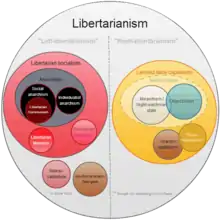Introduction
Libertarianism (from French: libertaire, itself from the Latin: libertas, lit. 'freedom') is a political philosophy that upholds liberty as a core value. Libertarians seek to maximize autonomy and political freedom, emphasizing equality before the law and civil rights to freedom of association, freedom of speech, freedom of thought and freedom of choice. Libertarians are often skeptical of or opposed to authority, state power, warfare, militarism and nationalism, but some libertarians diverge on the scope of their opposition to existing economic and political systems. Various schools of libertarian thought offer a range of views regarding the legitimate functions of state and private power. Different categorizations have been used to distinguish various forms of Libertarianism. Scholars distinguish libertarian views on the nature of property and capital, usually along left–right or socialist–capitalist lines. Libertarians of various schools were influenced by liberal ideas.
In the mid-19th century,' libertarianism originated as a form of left-wing politics such as anti-authoritarian and anti-state socialists like anarchists, especially social anarchists, but more generally libertarian communists/Marxists and libertarian socialists. These libertarians sought to abolish capitalism and private ownership of the means of production, or else to restrict their purview or effects to usufruct property norms, in favor of common or cooperative ownership and management, viewing private property as a barrier to freedom and liberty. While all libertarians support some level of individual rights, left-libertarians differ by supporting an egalitarian redistribution of natural resources. Left-libertarian ideologies include anarchist schools of thought, alongside many other anti-paternalist and New Left schools of thought centered around economic egalitarianism as well as geolibertarianism, green politics, market-oriented left-libertarianism and the Steiner–Vallentyne school. After the fall of the Soviet Union, libertarian socialism grew in popularity and influence as part of anti-war, anti-capitalist and anti- and alter-globalisation movements. (Full article...)
Selected article
Minarchism is a libertarian political ideology which maintains that the state's only legitimate function is the protection of individuals from aggression, theft, breach of contract and fraud (such states are sometimes called night watchman states). Some minarchists defend the existence of the state as a necessary evil. Minarchism is closely associated with right-libertarianism, propertarianism and classical liberalism.
Samuel Edward Konkin III, an agorist, coined the term in 1971 to describe libertarians who defend some form of compulsory government. Konkin invented the term "minarchism" because he initially felt dismayed of using the cumbersome phrase "limited-government libertarianism".
Selected quote
| “ | I remember the occasion when a fellow graduate student at Columbia from Sweden wanted to take me downtown to a restaurant for a Swedish meal and introduced me to the Swedish drink aquavit. This was a restaurant at which this Swedish fellow had been getting aquavit all during Prohibition; they had been selling it to him. And this was just after the repeal of Prohibition. We went there and he asked them for some aquavit. They said, "Oh, no, we haven't gotten our license yet." And finally, he talked to them in Swedish and persuaded them to take us into the back where they gave us a glass of aquavit apiece. Now that shows the absurdity of it.
Prohibition was repealed in 1933 when I was 21 years old, so was a teenager during most of Prohibition. Alcohol was readily available. Bootlegging was common. Any idea that alcohol prohibition was keeping people from drinking was absurd. There were speakeasies all over the place. But more than that. We had this spectacle of Al Capone, of the hijackings, of the gang wars... Anybody with two eyes could see that this was a bad deal, that you were doing more harm than good. In addition, I became an economist. And as an economist, I came to recognize the importance of markets and of free choice and of consumer sovereignty and came to discover the harm that was done when you interfered with them. The laws against drugs were passed in 1914, but there was no very great enforcement of it. |
” |
| — Milton Friedman (1912–2006) America's Drug Forum (1991) |
Selected picture
 The Nolan chart, whose basic form is used in the World's Smallest Political Quiz |
General images
Selected biography -
Adam Smith FRSA FRS FRSE (baptised 16 June [O.S. 5 June] 1723 – 17 July 1790) was a Scottish economist and philosopher who was a pioneer in the thinking of political economy and key figure during the Scottish Enlightenment. Seen by some as "The Father of Economics" or "The Father of Capitalism", he wrote two classic works, The Theory of Moral Sentiments (1759) and An Inquiry into the Nature and Causes of the Wealth of Nations (1776). The latter, often abbreviated as The Wealth of Nations, is considered his magnum opus and the first modern work that treats economics as a comprehensive system and as an academic discipline. Smith refuses to explain the distribution of wealth and power in terms of God's will and instead appeals to natural, political, social, economic, legal, environmental and technological factors and the interactions between them. Among other economic theories, the work introduced Smith's idea of absolute advantage.
Smith studied social philosophy at the University of Glasgow and at Balliol College, Oxford, where he was one of the first students to benefit from scholarships set up by fellow Scot John Snell. After graduating, he delivered a successful series of public lectures at the University of Edinburgh, leading him to collaborate with David Hume during the Scottish Enlightenment. Smith obtained a professorship at Glasgow, teaching moral philosophy and during this time, wrote and published The Theory of Moral Sentiments. In his later life, he took a tutoring position that allowed him to travel throughout Europe, where he met other intellectual leaders of his day. (Full article...)Related portals
Parent portals
Socio-political portals
Topics
Categories
Points of interest
| Points of interest related to Libertarianism on Wikipedia: History – Portal – Category – WikiProject – Alerts – Deletions – Assessment |
Associated Wikimedia
The following Wikimedia Foundation sister projects provide more on this subject:
-
 Commons
Commons
Free media repository -
 Wikibooks
Wikibooks
Free textbooks and manuals -
 Wikidata
Wikidata
Free knowledge base -
 Wikinews
Wikinews
Free-content news -
 Wikiquote
Wikiquote
Collection of quotations -
 Wikisource
Wikisource
Free-content library -
 Wikiversity
Wikiversity
Free learning tools -
 Wiktionary
Wiktionary
Dictionary and thesaurus
-
 List of all portals
List of all portals -

-

-

-

-

-

-

-

-

-
 Random portal
Random portal -
 WikiProject Portals
WikiProject Portals









.jpg.webp)



